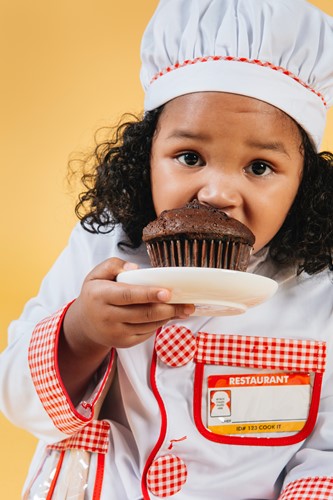Is sugar as bad as we think for little ones? For Aisha’s Nutritionist Priya Tew reveals all
When it comes to weaning, it’s hard to know which guidance to follow. Should we offer finger foods or purees first? Is fruit ok or should we stick to veg? Should all sugar be avoided? The list is endless, and according to research by baby food brand For Aisha, it seems this is leading to some confusion, with 1 in 10 parents struggling with what to feed their children to make sure their nutritional needs are met.
The survey of 2000 parents was conducted to uncover the current struggles parents are facing when it comes to feeding babies and children. The results showed that while 1 in 10 worry about their child’s weight, over half 54% were confused about the inclusion of sugar in their child’s diet.
Sugar is just one topic regularly up for discussion, and it’s one of the few foods to actually offer zero nutritional value. So what type of sugar can you give your kids, how much and how often? Here, Registered Nutritionist Priya Tew explains everything parents need to know about their child, sugar, and food:
Healthy habits
“Sugar is not good for trying to install healthy eating habits – once sugary foods are enjoyed, all other foods taste sour in comparison so are likely to be rejected, leading to fussy eating. It’s vital that little ones gain maximum nutrition from every tiny mouthful, especially during the weaning process.
Free Sugars vs Natural Sugars
Sugars are divided into what are called ‘free sugars’ and ‘natural sugars’. Free sugars as ones that are added into a food or drink eg. to biscuits, cakes, flavoured yoghurts, some breakfast cereals and cereal bars. The sugars in fruit juice, smoothies, honey, agave, syrups and sweet nectars are also counted as free sugars. These are the sugars to avoid giving your little one as much as possible. Natural sugars are those found in fruit, vegetables, milk, plain yoghurt, grains, pasta, rice, oats and flour. These are safe for your little one and can be included as part of a balanced diet.
Looking at the labels
Ideally, aim to keep your little one to as low a sugar intake as you can. If you aren’t sure if a food is suitable, then do check the food label. The “of which sugars” value is a total of both natural sugars and free sugars. This means that a fruit puree will look very high in sugar but those are natural sugars. So, you also need to check the ingredients list. Look for any added sugars, such as glucose, syrup, honey and of course sugar itself. You can compare products for sugar content by looking at the per 100g values, go for the lower sugar options.
Rules and recommendations
There is no official limit on how much sugar is too much for babies and toddlers under four years old but it is recommended in the UK that food and drinks containing sugar are avoided entirely. Sugar is also not good for dental health; almost a quarter of five year old children have been found to show signs of tooth decay and one of the biggest factors affecting this is the sugar in their diet.
Sweet Treats
There will always be times when there is an exception; maybe cake at a party or someone else gives them a biscuit. Take a tasty alternative with you to have ready to offer but do not panic if your little one has the odd bit of sugar – it’s what happens most of the time that counts as eating habits are often formed at a very young age.”
Emily Salter, Marketing Manager from For Aisha, said: “Sugar is something we know most parents worry about, which is why the whole For Aisha range is Sugarwise approved. With no added sugar, just tasty meals and snacks full of exotic flavours, parents can rest assured that they are making a great choice for their baby or toddler.”